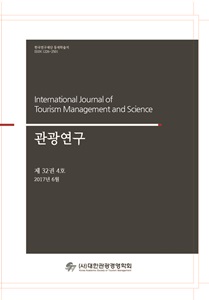- 영문명
- Leisure Inequality on Income : the Relationship of Leisure TimeㆍCost and Happiness
- 발행기관
- 대한관광경영학회
- 저자명
- 곽재현(Kwak Jae Hyun) 홍경완(Hong Kyung Wan)
- 간행물 정보
- 『관광연구』제32권 제5호, 293~309쪽, 전체 17쪽
- 주제분류
- 사회과학 > 관광학
- 파일형태
- 발행일자
- 2017.08.30

국문 초록
본 연구는 여가시간 및 소득수준의 증가에 따른 행복지수의 변화양상을 파악하여 경제학에서 거론되는 이스털린의 역설(Easterlin Paradox)을 여가학에 적용해 보는데 그 목적이 있다. 이를 위해 본 연구에서는 문화관광연구원의 <2014 국민여가활동조사>를 활용하여 여가 불평등(Leisure Inequality)에 대해 분석하였다. 결과 도출을 위해 빈도분석, 일원변량분석, 위계적 회귀분석을 실시하였다. Easterlin의 역설과는 달리, 본 연구의 결과에서는 소득과 행복의 관계는 선형적이었다. 또한 소득이 늘어날수록 여가비용은 증가하였으나 여가시간은 오히려 감소하였다. 결과적으로 소득의 증가는 여가만족에 영향을 미치고, 더 나아가 삶의 행복에도 긍정적으로 영향을 준다. 결국 소득의 증가는 여가만족에 영향을 미치고 삶을 행복하게 한다. 이 결과는 소득에 따른 여가 불평등을 의미한다.
영문 초록
The objective of this study is to apply the Easterlin’s Paradox to leisure studies through investigating the relationships among leisure time, income, and happiness in order to examine how happiness shifts as leisure time and the income levels increase. For the goal, using “Korean Leisure Life Survey 2014” from Korea Culture and Tourism Institute, we identified leisure inequality on Korea. For the analyses, frequency analysis, one-way ANOVA and hierarchical analysis were conducted. According to eh analysis results, the relationship between income and happiness showed linear graph, unlike Easterlin’s Paradox. As income increased, leisure-cost is proportionate, but leisure-time decreased. Consequentially, the increase in income affects leisure satisfaction, and furthermore makes life happy. This result means leisure inequality on socioeconomic level.
목차
요약
Ⅰ. 서론
Ⅱ. 이론적 배경
Ⅲ. 연구설계
Ⅳ. 분석결과
Ⅴ. 결론
참고문헌
Abstract
키워드
해당간행물 수록 논문
참고문헌
최근 이용한 논문
교보eBook 첫 방문을 환영 합니다!

신규가입 혜택 지급이 완료 되었습니다.
바로 사용 가능한 교보e캐시 1,000원 (유효기간 7일)
지금 바로 교보eBook의 다양한 콘텐츠를 이용해 보세요!


